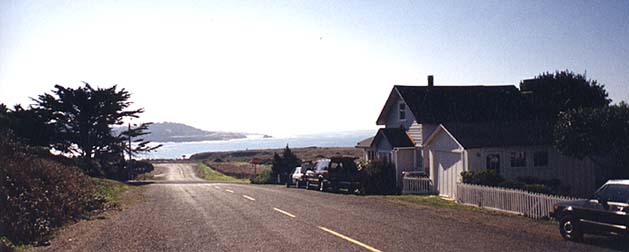
Pick A Mendocino
By
Lawrence C. Jorgensen, from Mendocino: Past and Present, 1972.
NOTE: Nothing has been changed, except the bolded emphasis. You tell me, in 1997 and 25 years after I originally wrote this, how wrong was I? I’d really like to know that I was. "So it goes." -- LCJ, 1997
I
Once, Mendocino was known only as the Mendocino of "Napa, Sonoma, and Mendocino'' wine fame. And while Northern California wines increase in fame, national and international, Mendocino more and more is becoming to mean the Coast. The ruggedly beautiful and still relatively unpolluted and sparsely populated Mendocino Coast.
Spectacular views of the ocean from bluffs fifty feet high; miles and miles of rocky and unpeopled beaches; great stands of timber, including the fabled redwoods; commercial and sport fishing for salmon with an infrequent twelve foot shark thrown in for tourist amusement. Almost one hundred miles of coastline constitutes the Mendocino coast-from Gualala in the south, to Rockport in the north, where Highway 1 swings back inland to join U.S. Highway 101.
And perhaps most important of all, the village of Mendocino itself. Surrounded on three sides by water, With its wooden sidewalks, its still functioning water towers, and its one-hundred year-old New England architecture. This community of just over 1,000 remains California's last significant link with its historic coastal heritage. Whether it will continue to exist as that link, or whether it will join the ever-growing list of plastic and make-believe communities, the world of Disneyland's and Magic Mountains, and Carmels ... All that remains to be seen.
For well over ten thousand years, the Indians — the Pomo -- made this area their home. The main roads today still follow their trading and hunting trails. The great forest, the innumerable streams and rivers, and the mighty ocean itself all provided these original Californians with a more than ample material culture. Indeed, the small amount of time required to satisfy their food and shelter requirements enabled these people to devote their energies, their creativity, to the construction of a rather sophisticated and meaningful religious and artistic life.
And all aspects of that life were part of a closely related totality. The animals and trees of the forest, the waters of the rivers and ocean, the fish, the birds, and all of the people were treated with a respect deeply rooted in their religious beliefs. Of course they cleaned up their garbage and sewage; lies and theft were almost unknown; all children found love and care from all of the adults. Theirs was a community rarely experienced before or elsewhere... and obviously not since. Warfare, naturally enough, was practically unknown.
Because their evil spirits attacked those who were too greedy about killing game or destroying trees; the Pomo may have been among the original environmentalists. If only their spirits, good and evil, had not fled into oblivion with the destruction of the Pomo people and culture by the white man. For the Mendocino Coast—the land upon which they lived, walked, prayed and died-cries out for love, for respect, for protection, today.
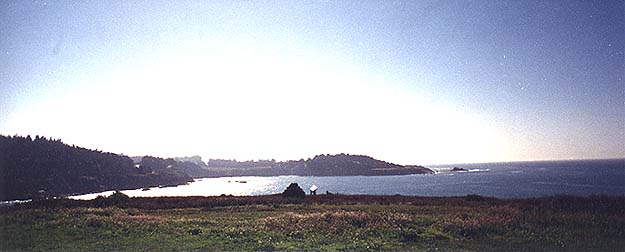
For well over ten thousand years, the Pomo and the land lived for and with each other, in mutual respect, love and abundance. For about one hundred years, the white man has been about his business along this Coast. And there is little respect, less love, and a rapidly decreasing abundance.
The Indians never presented any serious obstacle to the white man's advance and progress. The Pomo's previous several thousand years of relatively peaceful development left them totally unprepared for the greed and the power of the worshippers and followers of Caesar. Impoverishment, enslavement, disease, destruction and death was the sequence of payments meted out to these people who had served as guardians to the land for those many, many centuries.
The white American is a most recent arrival to these rivers, forests, coves and harbors. Essentially, a mere hundred years, one hundred years... the life of a single old Pomo! One of the curious -- though nonetheless ridiculous -- ironies of current Mendocino political developments is the sometime divisions between "old timers" and "new-comers." Some white people arrived one hundred years ago; others, fifty: most within the past twenty, or ten-including those who came yesterday, or the day before. To those who looked after this land for thousands of years, what could possibly be the difference between one year and one hundred years? From the vantage of ten thousand, all of us must necessarily look alike.
The county of Mendocino, as the local residents proudly assert, has the lowest per capita income in the entire state. Employment is seasonal and difficult to acquire; and when found, generally pays only the minimum wage. The residents of Mendocino village and its environs seem to prefer it that way. Tourism -- the week-end-trippers from San Francisco, and summer vacationers from all over North America -- provides its overwhelming source of income.
The weekend and summer crowds, the impossible traffic snarls along Main Street, the often patronizing behavior of the city tourist ... these are all part of the price that the local people appear willing to pay for the rest of the year. But, even then, the summers are spectacular, clear, star-lit skies, days when you can look out over the ocean and see forever; forests of redwood and fir; trails and paths to explore for hours — for days, even, with never another tourist to confront.
Conventional night life is a bit sparse for a recently transplanted Los Angeleno as myself, but an early morning walk along the headlands, the sun rising over the forest covered hills to the east of town, more than compensates for the limitations of night life. And then, there are the Sunsets! As that fiery red ball settles slowly into the ocean, it sends out those long narrow fingers of light to where you are standing high upon the bluff. Trying to snare your soul, to carry it into a better world. At that moment, the ancient pagan cry for Thor … for Wodin, himself, is once again heard reaching out across the water.
Several problems confound the writer who attempts a literal definition of Mendocino. Everywhere and at all times, the physical reality that constitutes the real Mendocino intrudes itself upon your consciousness, obstructing your involvement with and description of the historic and the present Village of Mendocino.
The stormy, rainy, overcast, dark, bleak, damp days are no less an impediment than the clear, sunny, "see forever" days. From one physical, climatic extreme to the other and through all of the various places along the continuum in between, a certain and persistent awareness grows within. This Coast, this place, this time ... this thing called Mendocino ... is magical.
Even the current involvement with whales and whale watching is simply an excuse, for most people, to sit quietly on the headlands ... to stare off across the expanse stretched before you. Ostensibly watching for the tell-tale little spouts from these great and perishing mammalian relatives of ours, the watchers are looking at and thinking of other things, other places ... other times and other spaces.
Here, the ocean is not simply the place one goes on a hot summer day: to run along the sand; to play volley ball; to plunge into the cooling surf; or to sip a beer, sit and talk with others with whom you share a few hours respite from the glare and the heat, from the glass and the concrete that is the city.
No, here in Mendocino, and all along this Coast, the ocean means none of that. It is more, much more. And that more is again so much more that the difference is quantum and qualitative in nature ... dialectical, if you prefer. For all of the various physical experiences and perceptions become fused into a single, indefinable, inexpressible psychic awareness.
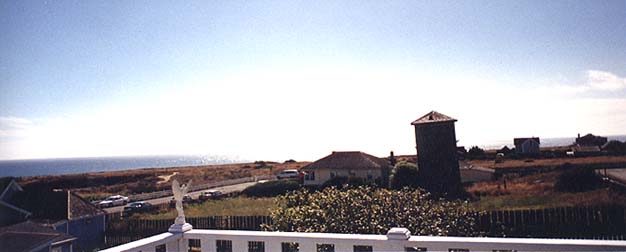
Consequently, activities such as whale-watching from the headlands; beachcombing after the tremendous and awesome, northwesterly winter storms; exploring the tide pools and the rocky, half-submerged ledges at low-tide and on calm days; artists painting, sculpturing, photographing, together with the musicians, the poets -- all these and numerous other kinds of physical movings and doings, creative and prosaic all share in and with this privileged awareness, this immense flowing of energy. Privileged, yes, but there for all willing to sit ... willing to sit and listen.
What is the attraction of this long narrow strip of irregular and rugged coastline separated from the rest of the country, from the rest of the nation, by a low, redwood and fir-timbered coastal range? Ah, and what is the secret the ocean holds; what the lesson it teaches?
Sit there. Sit there and let it be. Sit there and let it happen. Sit there and look ... look closely, and slowly it will come. You are alone and you are not alone, nothing matters and it all matters, you are powerless and you are all powerful, you are separate and you are a part of it ... the spectacular and ever changing immensity of it all. The ocean connects the land to the sky; it is the way from here to there, the carrier of souls from earth to heaven.
Because it has existed since the time the gods called it forth from within their imagination, because geologic ages have worked their visible influence, it has already lasted forever, as it will continue to last forever. We are connected to it. We are connected to and a part of the never ending, the ever changing, eternal, immortal. The ocean is our chariot, the only one we need. And someday, someday soon, WE SHALL BE THE GODS.
And as your eye then follows the land stretching back from the Coast, up through the fog, slowly rising through the fog, or sharply outlined in the brilliant sun, a similar mystical phenomenon occurs. From the water's lapping edge at high tide, through the several miles and terraces of ever changing botanical and geological evolution, into the timbered slopes and valleys of the coastal range, the same sense of continuity persists ... engulfs you as you journey across the successive steps, through our own evolutionary past, into the redwoods, the massive firs, to the crest of the mountains.
And from there, you look back ... back and down to the ocean from whence you came, from whence we all came. And the path from there to there, from land to sky, from earth to heaven, stretches out clearly before you -- physically and literally, psychically and mystically. The ocean, clearly, brought you to earth, to the land; one day, it will carry you back away from it ... to where you go next.
That is the secret. That knowledge, that awareness, is the magic called Mendocino. For when you look back from those mountains, back and down ... there close to the edge of the world, close enough to be the edge itself, is the Village of Mendocino.

II
Back in the late 1960's, when I first began visiting this area, this Mendocino, politics and political discussions of any sort were a no no. Obviously, most people had come to this area --certainly those within the past ten years or so -- in the hope of escaping the city. The apparent lack of sensitivity, the individual powerlessness, the manipulation of one's life by external forces and pressures -- all of which regularly drives more and more people out of the city. Out of the city, to where "you can do your own thing." The attitude was "that is why we left the city, man, to get off the political trip."
Drugs and "some of the great highs I have known," the occult and Tarot cards, rock music; sun, rising, and moon signs -- these constituted the foci of the endless discussions, of many of the relationships. Without doubt, much of the charm of those days lay in the almost total negation of the issues, the values, and the politics of the city. The long-hairs, the freaks, the hip middle-class "dropouts," the writers and artists, all seemed to consciously refuse to admit that this world -- the world of the Mendocino Coast -- belonged to any other. Regardless of its past history, Mendocino now existed as a refuge for a small and privileged portion of troubled mankind.
It was the Edge of the World. Once, all of America was viewed as that edge, that rim of the world that offered a hope of universal transformation ... a New Zion in the Wilderness. Often, that edge was the city itself. In time, only a part of that city, a neighborhood . . . a Left Bank, a Village, an Old Town, a North Beach, a Haight. At other times, and this appears to be one of them, the edge was transported out of the city and into the country -- to a Walden, a Brook Farm, a Mendocino.
"And we were never meant to worry, the way that people do," proclaimed one of their songs of the period. They really believed that they were in some essential way different than and from all of the rest of the humanity about them. As if they were the product of a Special Creation --and consequently free from the sins, original and pedestrian, of their parents, their culture. What a pity it was never true; a pity for them, and more than a pity for the America and The World that had temporarily raised itself into a euphoria of hope that an American generation had arrived that would finally "seize the time."
The dream of children … and the children of all ages. Refugees from the ''Children's Crusade" of the 1960's. Singing, "Don't worry about tomorrow … live for today." Acting it out into the 1970's as if they had somehow or other altered America in some fundamental sense. Never really understanding the nature and function of the Vietnam War, never understanding the nature of the society from which they had sprung and of which they were a part. More, refusing with a deliberateness and a vehemence that in any other social order but this one would be labeled pathological. But here in America in general and in these little enclaves of American refugeedom in particular, this negation of societal and historical imperatives parades as Americanism itself.
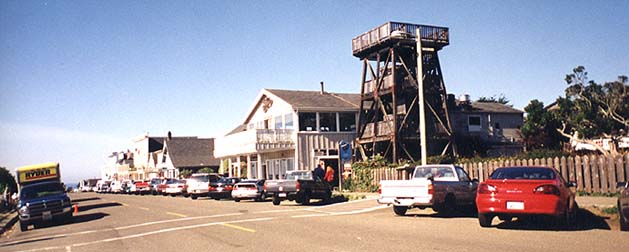
III
Where did that Mendocino go? Of course, it went nowhere; for that place never actually existed except as a state of mind, a projection of the desire to negate the America from which they had split. And how long could the dream last? How long does any dream continue to work its mysterious power over the mind? For inherent in the dream of a New Zion, of a new paradise, lies the contradiction that in the end must destroy the promise. How long can a New World be or remain better than the Old, unless the inhabitants deliberately act to insure that betterment?
What is now happening had to happen. They fled the urban nexus, believing that here in Mendocino, their "Magical Land," as they once called it -- here in Mendocino, they would be left alone. Even in the beginning, though, they were not really left alone. There were continuous hassles with the "old timers," the rednecks," as the newcomers worked their way into the local community -- in turn becoming locals themselves. Those earlier "old timers" undoubtedly knew that this latest wave of refugees was the harbinger of their own passing ... just as surely as they and their parents had been the vehicle and the cause of the destruction of the communities that had existed before them ... the Pomo, for example.
Through thrift, hard work, skill, greed, or ruthlessness, or through some combination of these, refugees -- or their children -- have risen to become partners with the managers of the New World. But for some to get ahead, others must necessarily fall behind. To have managers, one must necessarily have the managed. To become rich, to have more than enough, some must necessarily have less than enough. And to possess the new land as one's own, the others -- the previous possessors -- must be disposed.
Everywhere in America, the newcomers have finally usurped and taken possession of the land from the "old timers," from the indigenous possessors of the land. And, in turn, these newcomers became the indigenous. And, in turn, they must face the thrust, the power, the invasion, of the next wage of newcomers. Eventually, possession is taken in title and in name only. Local businesses and property, from lumber mills and hotels and newspapers, to empty lots and quaint old Victorian homes, are now purchased by and managed from outside of the community itself.
The inevitability of it all is the most striking aspect of what's happening. The inevitability of the change; and the inevitability of the direction of that change; and the inevitability of the growing, though fated, resistance to that change. A kind of naivete exists here that is explained only by the nature of the motive force that drove so many of these people to this place. A total unawareness that they are themselves the very carriers of the very thing they would control, or stop. As if one link in the food chain, when sated, could hope to call a halt to the next step in the process. And so they -- as our people always have in their journey from one continent to another, and then the long trek across this one, this America -- carried the Old World disease into the New ... the newest of the New Worlds ... the latest, and hopefully last, of the New Zions.
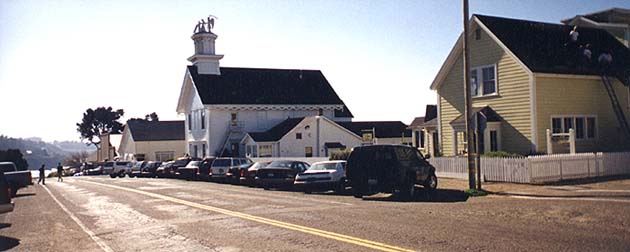
Unless you are one of the few "beach freaks," spare-changing the tourist for your wine and dope money, or unless you live way back in the woods, hunting, trapping, and gathering nuts as the Pomo did, avoiding the social order is an impossibility. Somewhere along the line, you find yourself plugged back into, and participating in, the very social-economic system you thought you had fled. Many continue to deny this, of course. They must continue to insist that they do not function within, nor contribute to, the very social organization that drove them to here. As if one can literally and actually "drop out" of America.
But more and more tourists come each summer; and more and more remain as residents. Each summer day now, Main Street resembles a city parking lot. Automobile after automobile, campers and more campers, trailers and trailers; and without doubt, those ultimate ecological obscenities motor homes -- those gross, self-contained, self-propelled chrome and plastic worlds. And with all this comes the apparent need and demand for more hotels, motels, campgrounds; more building sites and more subdivisions. Reality and realty become intertwined and focused upon the sound of redwoods crashing, of logging trucks hauling out the dwindling forest.
Development, growth, brings higher and higher land prices, higher and higher rents, higher and higher taxes, higher and higher prices for down payments. Development and growth means increasing difficulty for those on fixed and minimal incomes. It means the eventual impoverishment of the "old timers" on Social Security; it means the destruction of that segment of the artistic community that has failed to find commercial success with the increasingly expensive-to-operate art galleries. It means, once again, a changed and changing Mendocino.
So, what is to be done? Many of the people here will no doubt leave for elsewhere. Americans excel at running from their problems. After all, we came to the New World to escape the Old, and in a mere two hundred years, have raced completely across this continent -- leaving behind our wasted and stripped lands, polluted rivers and lakes, poisoned air and corrupted cities. Just where is there a place left ... to spoil? Others seem ready to stay and resist. Today, only the very young, the very drugged, or the very naïve still hold fast to the fantasy that was Mendocino. Those others, only minimally less naive, talk more and more about planning and coastal commissions, zoning laws, growth moratoriums, and town incorporation.
Ah, but the most hopeful and important of all, the people — be they long haired or short, recently arrived or long-time residents -- are having their collective nose rubbed in one of the fundamental facts of contemporary American society. Each day and each new development brings them closer and closer to the knowledge that they still have no essential control over either their lives or over the area in which they live. And with that knowledge, they may yet cease the petty bickering and fighting among themselves, and come eventually to the realization that they are not the colonists they thought. No, we are not colonists, or even colonials. Simply, we are the Colonized.
"What is important to remember is that we study these matters, these
events and perceptions, not to understand them for their own importance...
they have none; but to glean some sort of insight into those people called
Americans who instigated, acquiesced, or ignored them. For that, even at the
end, remained the vast majority." —E.E. Lynlar
-- Lawrence C. Jorgensen, Mendocino, 1972
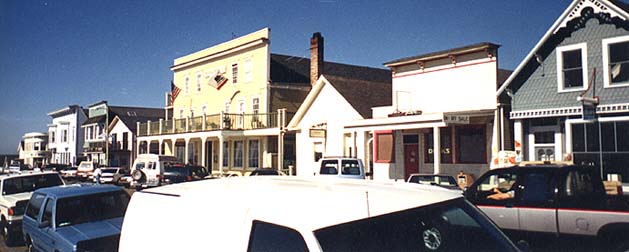
Comments | LCJ Home Page | to the top